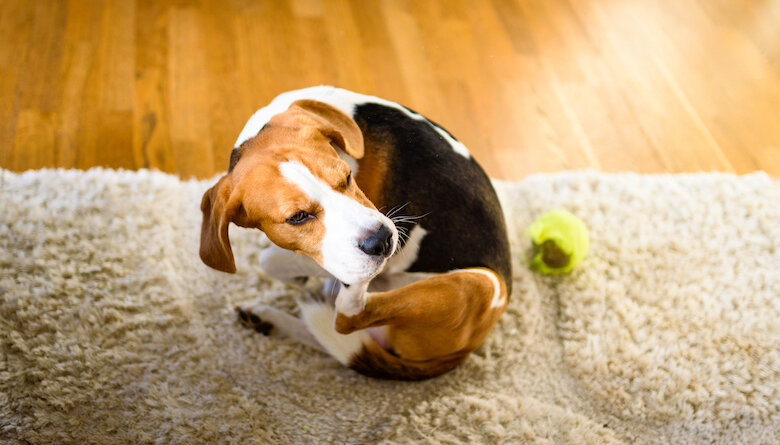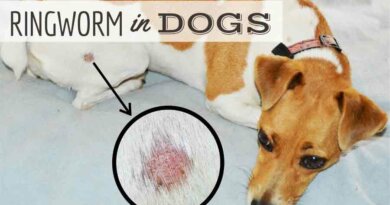Does Your Dog Have a Mold Allergy?
One of the most common skin diseases that develop in dogs is atopic dermatitis. Most of these cases are caused by allergies to substances in the environment. Dog owners are aware of the possibility that their dogs may have environmental allergies to plant pollen and dust or dust mites, but may be completely unaware of one more very significant environmental allergen that can cause ill effect on susceptible dogs: mold.
Molds are a type of multicellular fungi that are present almost everywhere in the environment including the air; favored surfaces include wood, leaves and plants, air ducts, soil, and basements. They thrive in moist, damp, and humid environments, multiplying through microscopic spores that disseminate through the air. Because dogs tend to explore environments – especially with their noses – they can be at increased risk for coming into contact with and inhaling mold spores.
Molds are usually harmless in small quantities, but they can cause problems if a dog is sensitive to them and suffers an allergic reaction. An allergic reaction occurs when the dog’s immune system responds to a substance with a state of over-reactivity or hypersensitivity. If the allergy becomes chronic, it can become uncomfortable and even painful; if not treated, it can lead to the development of more severe health issues.
Symptoms of mold allergies in dogs
Dogs allergic to mold typically develop a year-round skin problem. If they are allergic to mold, the symptoms may wax and wane with atmospheric humidity (which allows molds to reproduce at a faster rate) but will be present to some extent year-round, because the offending allergen is present all the time, not just seasonally like some pollens. This allergy is most likely to develop in dogs between the ages of 6 months and 3 years, however, dogs can develop an allergy at any time during their lifetime.
Mold allergies tend to manifest as a skin condition. Symptoms may include scratching (often persistent), inflamed and irritated skin; dry scaly skin, localized or generalized hair loss, chewing/licking (especially the paws); chronic ear infections. It is also possible, but uncommon, for molds to cause respiratory symptoms such as coughing, sneezing, wheezing, labored breathing, discharge from nose and/or eyes, and even loss of appetite and lethargy in more severe cases. Dogs with mold allergies are also frequently affected by other inhalant allergens, such as mites.
Diagnosis
Mold allergies cannot be distinguished from other types of allergies without allergy testing, but your veterinarian may first want to perform a thorough exam, obtain a history, and perform other diagnostics to determine if the presenting condition is caused by or complicated by an infection or another disease that resembles atopic dermatitis.
Allergy testing in dogs typically takes one of two forms: intradermal skin testing or blood serum testing. Intradermal allergy testing is considered the gold standard for the diagnosis of atopic dermatitis and involves injecting small quantities of 40-60 different types of allergens into the dog’s skin, typically performed under general anesthesia by a veterinary dermatologist. A visible swelling will occur at the injection site if a dog has a reaction to the allergen, allowing determination of which allergens are triggering atopic dermatitis. Blood testing can be performed in a general veterinary practice; a blood sample is drawn from the dog and submitted to a testing laboratory. The lab searches for the presence of antibodies to allergens that are known to contribute to atopic dermatitis. The results of these tests can be used to formulate an allergen-specific immunotherapy based on the offending allergens.
Management and treatment of mold allergies
The treatment of allergies, including those caused by molds, usually involves two steps: get control and keep control. This frequently requires using one or more therapies, often in combination with one another; these include, but are not limited to, corticosteroids, antihistamines, ATOPICA® (cyclosporine capsules), and Cytopoint® (Lokivetmab).
Allergen immunotherapy, also known as desensitization or hyposensitization, consists of administering gradually increasing quantities and strengths of relevant allergens, either by subcutaneous injection or sublingual drops. The goal of this treatment is to help build tolerance to the allergens by tempering the immune response. This custom immune-therapy regimen can take up to 12 months before a response is observed. But the commitment may be well worth it as it may not only prevent the current allergies from worsening but also help prevent new allergies from developing.
Dogs suffering from allergies often develop secondary recurrent ear and skin infections. The inflamed skin can be susceptible to bacterial and yeast infections, which in themselves can lead to even more scratching. Targeted topical antimicrobial therapy shampoos and sprays containing chlorhexidine, miconazole, and/or ketoconazole may be recommended, as well as ear cleansers and treatments. In severe cases, oral systemic treatments with drugs such as ketoconazole, itraconazole, or terbinafine may be necessary.
Environmental therapy
Reducing the mold levels in your dog’s environment can help mitigate exposure and thereby reduce allergy symptoms. Unfortunately, because mold is all over, completely avoiding contact is not possible. Ideally, keep your dog (and his bed!) out of damp basements or garages; frequent baths or wipe-downs with a damp microfiber cloth can help remove mold spores that fall on his skin and coat. Inspect your dog’s favorite places, especially under his bedding. Large mold infestations in the home can usually be seen or smelled. If mold is present, these areas should be cleaned and treated appropriately. Depending on the location, extent, and type of mold, this may need to be done by a professional service.
Because a mold allergy is environmental and environmental allergens are everywhere, complete alleviation of the condition is not usually possible and most dogs will require lifelong treatment. But it can be successfully managed, resulting in a happier and more comfortable dog.
Photo: Przemysław Iciak/Getty Images






I was recommended this website by my cousin. I am not sure whether this post is written by him as nobody else know such detailed about my trouble. You are incredible! Thanks!
darkmarket list darknet market how to access dark web
But a smiling visitor here to share the love (:, btw outstanding pattern.
We’re a gaggle of volunteers and opening a new scheme in our community. Your site provided us with useful info to paintings on. You have performed an impressive activity and our entire community will likely be thankful to you.
It’s in point of fact a nice and helpful piece of information. I am happy that you shared this useful info with us. Please stay us up to date like this. Thanks for sharing.
Some really excellent content on this internet site, thanks for contribution. “An alcoholic is someone you don’t like who drinks as much as you do.” by Dylan Thomas.
I like what you guys are up too. This sort of clever work and coverage! Keep up the good works guys I’ve you guys to blogroll.
Thank you for some other informative site. The place else could I get that type of information written in such an ideal method? I have a undertaking that I’m just now working on, and I’ve been on the look out for such info.
This is a topic close to my heart cheers, where are your contact details though?
Very well written article. It will be beneficial to anybody who usess it, including myself. Keep doing what you are doing – i will definitely read more posts.
I like what you guys are up too. Such intelligent work and reporting! Carry on the superb works guys I have incorporated you guys to my blogroll. I think it will improve the value of my website 🙂
Great line up. We will be linking to this great article on our site. Keep up the good writing.
superb post.Never knew this, thankyou for letting me know.
Some genuinely wonderful blog posts on this website, thanks for contribution. “Gratitude is merely the secret hope of further favors.” by La Rochefoucauld.
I simply could not leave your web site before suggesting that I actually loved the usual information a person supply for your guests? Is gonna be back often in order to check up on new posts.
Hi there, You’ve done a great job. I’ll definitely digg it and individually suggest to my friends. I’m confident they will be benefited from this website.
It’s actually a great and useful piece of information. I’m happy that you just shared this useful information with us. Please keep us informed like this. Thanks for sharing.